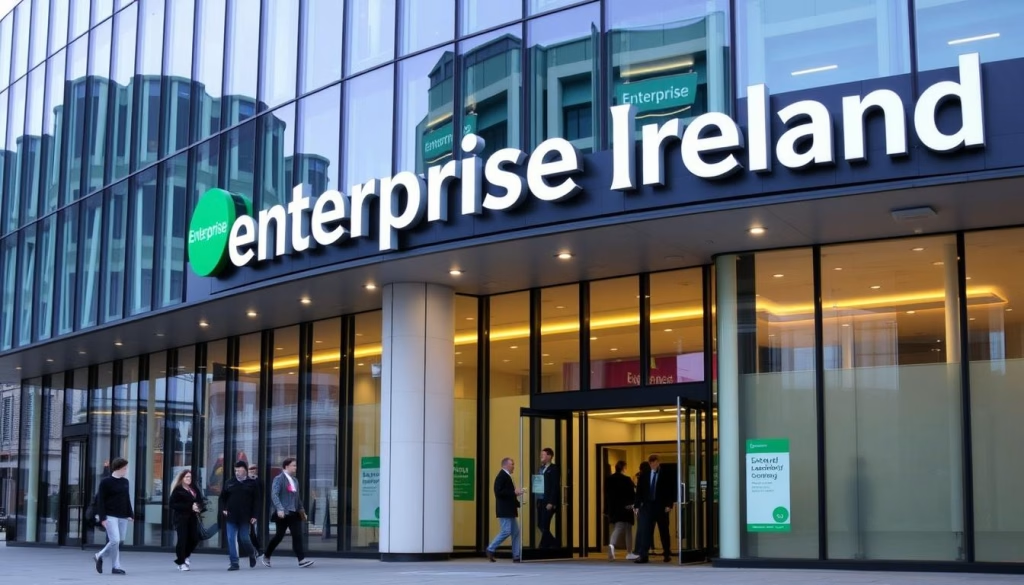Ireland has emerged as one of Europe’s most attractive destinations for business expansion. With its strategic location, favorable tax environment, and skilled workforce, companies looking to expand business in Ireland gain a powerful gateway to European markets. This comprehensive guide will walk you through the essential steps, requirements, and strategies to successfully establish your business presence in Ireland, helping you navigate the complexities of international expansion with confidence.
Ireland Market Overview: Why Expand Business in Ireland?
Dublin’s business district has become a hub for international companies expanding into Europe
Ireland offers compelling advantages for businesses seeking European expansion. With projected growth of 4.0% in 2025 and 3.6% in 2026, the Irish economy continues to outperform many European counterparts. This economic strength, combined with Ireland’s strategic position as an English-speaking EU member, creates unique opportunities for international businesses.
Key Industries Driving Growth
Technology
Ireland has earned its reputation as the “Silicon Valley of Europe,” hosting 16 of the top 20 global tech companies. The tech sector continues to expand, with particular strength in:
- Software development and SaaS
- Data centers and cloud computing
- Fintech and digital payments
- Cybersecurity solutions
Pharmaceuticals & Life Sciences
Ireland has become a global leader in pharmaceuticals and medical devices, with significant investment in:
- Pharmaceutical manufacturing
- Medical device innovation
- Biotechnology research
- Healthcare technology
Regional Opportunities Beyond Dublin
While Dublin remains the primary business hub, several other regions offer compelling advantages for companies looking to expand business in Ireland:
| Region | Key Industries | Business Advantages |
| Cork | Pharmaceuticals, Technology, Food Production | Lower operating costs, university talent pool, international connectivity |
| Galway | Medical Technology, Software, Manufacturing | Specialized medtech cluster, quality of life, research partnerships |
| Limerick | Technology, Manufacturing, Financial Services | Competitive costs, skilled workforce, strategic location |
Unsure which Irish region best suits your business?
Our location assessment service analyzes your specific industry requirements and business objectives to identify the optimal location for your Irish expansion.
Legal & Regulatory Steps to Expand Business in Ireland
Company Registration Process
Establishing a legal entity in Ireland requires careful planning and adherence to specific procedures. The most common business structures include:

- Most common and flexible structure
- Requires just one director
- No minimum share capital required
- Limited liability protection
- 12.5% corporate tax on trading income
- Annual returns filing with CRO required
Private Limited Company (LTD)
- Defined business purpose required
- Minimum of two directors needed
- Must maintain authorized share capital
- Limited liability protection
- 12.5% corporate tax on trading income
- More structured reporting requirements
Designated Activity Company (DAC)
- Extension of foreign company
- Not a separate legal entity
- Must register with CRO within 30 days
- Parent company remains liable
- Tax only on Irish-generated profits
- Must file parent company financials
Branch Office
Tax Requirements and Compliance
Understanding Ireland’s tax system is crucial for businesses expanding into the market. The country offers attractive tax incentives while maintaining specific compliance requirements:
Corporation Tax
- Trading income: 12.5% (one of Europe’s lowest rates)
- Non-trading income: 25%
- Capital gains: 33%
- R&D tax credit increased to 30% for qualifying expenditures
- Annual filing required within 9 months of financial year-end
Value Added Tax (VAT)
- Standard rate: 23%
- Reduced rates: 13.5%, 9%, and 4.8% for specific goods/services
- VAT registration required if turnover exceeds thresholds
- VAT returns typically filed bi-monthly
- Certain sectors qualify for VAT exemption
Employment Laws and Regulations
When hiring in Ireland, employers must comply with specific labor regulations:

- Provide written employment terms within five days of starting
- Minimum wage of €13.50 per hour (as of 2025)
- Maximum working week of 48 hours
- Four weeks of paid annual leave plus public holidays
- Employer PRSI contributions of 11.15% (increasing to 11.25% from October 2025)
- Maternity leave of 26 weeks (with potential for additional unpaid leave)
- Compliance with health and safety regulations
Important: Non-EU employees require work permits, with different categories based on skill level and salary. The General Employment Permit requires a minimum salary of €34,000 and typically requires a Labour Market Needs Test.
Need help navigating Irish regulatory requirements?
Our regulatory compliance package ensures your business meets all legal requirements when expanding to Ireland, from company registration to tax compliance and employment law.
Cultural Considerations for Business Success in Ireland
Understanding Irish business culture is essential for successful integration into the market. While Ireland is a modern, globalized economy, certain cultural nuances can significantly impact business relationships and negotiations.

Business Etiquette in Ireland
Communication Style
- Irish business communication tends to be direct yet diplomatic
- Humor and storytelling are valued in business contexts
- Building rapport before discussing business matters is important
- Email communication should be professional but personable
Meeting Protocols
- Punctuality is expected but not rigidly enforced
- Meetings often begin with small talk before addressing agenda items
- Business cards are exchanged but without formal ceremony
- Decision-making may take longer than in some other business cultures
Negotiation Styles and Relationship Building
Irish business culture places significant emphasis on relationship building. Understanding the negotiation approach can help foreign businesses navigate deals more effectively:
“In Ireland, the strength of your business relationship often determines the success of your negotiation. Take time to build trust before pushing for closure.”
- Negotiations tend to be collaborative rather than confrontational
- Personal connections and trust are highly valued
- Decision-making often involves multiple stakeholders
- Contracts are important but relationship quality remains paramount
- Follow-up and maintaining contact is expected after meetings
Local Consumer Behavior
For businesses targeting Irish consumers, understanding local preferences and behaviors is crucial:

- Irish consumers value quality and authenticity in products and services
- Local and sustainable offerings are increasingly important
- Digital adoption is high, with strong e-commerce penetration
- Brand loyalty exists but is balanced with price sensitivity
- Word-of-mouth and social proof significantly influence purchasing decisions
- Customer service expectations are high, with personalized attention valued
Cultural Insight: Building genuine connections with Irish business partners often happens outside the office. Business lunches and occasional after-work gatherings are common for relationship development.
Market Entry Strategies for Irish Expansion
Selecting the right market entry strategy is critical when you expand business in Ireland. Each approach offers distinct advantages and challenges based on your company’s resources, timeline, and long-term objectives.

Comparing Market Entry Options
| Entry Strategy | Pros | Cons | Best For |
| Local Partnership | Market knowledge, existing networks, shared risk, faster entry | Profit sharing, potential conflicts, less control | Companies with limited local knowledge seeking faster market access |
| Subsidiary Establishment | Full control, tax benefits, brand consistency, EU market access | Higher initial investment, longer setup time, regulatory complexity | Companies planning long-term presence with sufficient capital |
| Acquisition | Immediate market presence, existing customer base, established operations | High upfront cost, integration challenges, potential cultural clashes | Companies seeking rapid growth with available capital |
| Distributor/Agent Model | Low initial investment, minimal regulatory requirements, flexibility | Limited control, brand representation challenges, lower margins | Testing market potential before full commitment |
Selecting the Optimal Entry Strategy
When determining your approach to expand business in Ireland, consider these key factors:
Business Factors
- Available capital and resources
- Timeline for market entry
- Risk tolerance and management
- Long-term strategic objectives
- Intellectual property protection needs
Market Factors
- Industry-specific regulations
- Competitive landscape
- Supply chain considerations
- Customer acquisition challenges
- Potential for market growth
Uncertain which market entry strategy is right for your business?
Our market entry consultants can analyze your specific business needs and objectives to recommend the optimal approach for your Irish expansion.
Localized Marketing Strategies for the Irish Market
Effective marketing is essential when you expand business in Ireland. Adapting your approach to local preferences and behaviors can significantly impact your success in the Irish market.

Adapting Your Brand for Irish Audiences
- Maintain authenticity while acknowledging local culture
- Consider Irish sensibilities and humor in communications
- Highlight community involvement and sustainability initiatives
- Adapt messaging to emphasize quality and value
- Ensure visuals and examples reflect local context
Digital Marketing Trends in Ireland
Ireland has a highly digitally engaged population, with specific trends shaping effective online marketing:
Social Media
- Instagram and TikTok growing rapidly for B2C engagement
- LinkedIn remains dominant for B2B marketing
- Facebook still relevant for older demographics
- Video content performs particularly well across platforms
Content Marketing
- Educational content that solves problems drives engagement
- Storytelling formats resonate with Irish audiences
- Podcast listenership continues to grow significantly
- Local case studies and testimonials build credibility
Localized SEO Practices
Optimizing your digital presence for Irish search engines requires specific approaches:

- Register and optimize for .ie domain extensions
- Include location-specific keywords (Irish cities, regions)
- Create content addressing local market pain points
- Ensure NAP (Name, Address, Phone) consistency across platforms
- Optimize for mobile users (85% of Irish adults access internet via smartphone)
- Leverage Google My Business for local visibility
- Build backlinks from reputable Irish websites and directories
Important: When expanding business in Ireland, ensure compliance with GDPR regulations in all marketing activities. Irish consumers are particularly sensitive to data privacy issues.
Case Study: Successful Business Expansion to Ireland
TechNova: From US Startup to European Success
Company Background
TechNova, a US-based SaaS company specializing in supply chain management solutions, sought to expand business in Ireland as their European headquarters in 2022. With 85 employees and $12M in annual revenue at the time, they needed a strategic approach to enter the European market.
Challenges Faced
- Limited understanding of European regulatory requirements
- No existing customer base in the region
- Need to recruit specialized technical talent
- Adapting product features for European market needs
Expansion Strategy
TechNova implemented a phased approach to their Irish expansion:
- Established a private limited company (LTD) in Dublin
- Partnered with Enterprise Ireland for initial guidance and networking
- Hired a local leadership team with European market experience
- Adapted product features to meet EU compliance requirements
- Developed localized marketing campaigns targeting key industries
Results After 24 Months
- Grew European team to 42 employees
- Achieved €8.5M in European revenue
- Expanded to 215+ European clients across 14 countries
- Established R&D partnership with Trinity College Dublin
- Qualified for R&D tax credits, reducing effective tax rate
Key Success Factors
Strategic Decisions
- Choosing Dublin’s Silicon Docks for tech talent access
- Hiring local leadership familiar with European markets
- Leveraging government support programs
- Phased expansion approach to manage risk
Operational Excellence
- Thorough compliance planning before launch
- Investment in localized marketing and sales
- Building strategic partnerships with local institutions
- Adapting product for European requirements
Essential Resources for Business Expansion to Ireland
Accessing the right support networks and resources can significantly streamline your journey to expand business in Ireland. The country offers numerous programs specifically designed to assist foreign companies.

Government Grants and Support Programs
| Organization | Support Offered | Eligibility |
| Enterprise Ireland | Market research, networking events, funding grants, mentorship | Foreign companies creating jobs in Ireland |
| IDA Ireland | Site selection, establishment grants, R&D funding, strategic introductions | Foreign direct investment projects |
| Local Enterprise Offices | Microfinance loans, business advice, training programs | Small businesses with fewer than 10 employees |
| Science Foundation Ireland | Research partnerships, innovation grants, talent development | Companies with research & development focus |
Key Business Networks and Associations
Building connections within the Irish business ecosystem can accelerate your market integration:
Industry-Specific Networks
- Technology Ireland – Tech sector association
- BioPharmaChem Ireland – Pharmaceutical industry group
- Irish Medtech Association – Medical technology network
- Financial Services Ireland – Banking and finance community
General Business Organizations
- Chambers Ireland – National chamber of commerce network
- American Chamber of Commerce Ireland – US-Ireland business
- Small Firms Association – SME support organization
- Business Network International (BNI) – Referral organization
Logistics and Infrastructure Partners
Establishing efficient operational systems requires reliable partners:

- Banking Partners: AIB, Bank of Ireland, Ulster Bank offer specialized services for international businesses
- Logistics Providers: DHL, UPS, and local providers like Nightline offer comprehensive shipping solutions
- Office Solutions: Serviced office providers including Regus and Glandore offer flexible workspace options
- Professional Services: Major accounting firms (KPMG, PwC, Deloitte, EY) have dedicated international business teams
- Legal Support: Firms like A&L Goodbody, Arthur Cox, and Matheson specialize in foreign business establishment
Ready to access Ireland’s business support ecosystem?
Our network development service connects you with the right government agencies, industry associations, and service providers to accelerate your Irish expansion.
Final Steps: Your Roadmap to Successfully Expand Business in Ireland
Expanding your business to Ireland offers tremendous opportunities for growth, market access, and operational advantages. By following a structured approach and leveraging available resources, you can navigate the complexities of international expansion with confidence.

Your Irish Expansion Checklist
- Market Research: Validate your business model for the Irish market
- Entry Strategy: Determine the optimal approach (partnership, subsidiary, acquisition)
- Legal Structure: Select and establish the appropriate business entity
- Regulatory Compliance: Register for taxes and ensure all legal requirements are met
- Banking & Finance: Establish financial infrastructure and funding channels
- Talent Acquisition: Develop hiring strategy and understand employment regulations
- Location Selection: Choose optimal business location based on your needs
- Marketing Adaptation: Localize your marketing approach for Irish audiences
- Network Development: Build relationships with key partners and organizations
- Operational Launch: Execute phased implementation of your expansion plan







